Iran, Russia Discuss Launching Joint Shipping Company
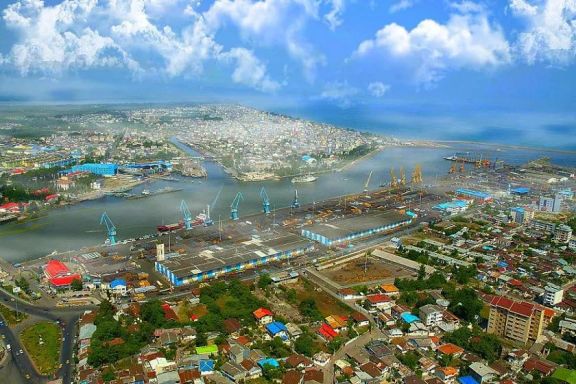
Iran and Russia have discussed plans to launch a joint shipping company amid international sanctions on both countries and expanding bilateral ties.

Iran and Russia have discussed plans to launch a joint shipping company amid international sanctions on both countries and expanding bilateral ties.
Iranian Road Minister Mehrdad Bazrpash, who has travelled to Russia to attend the 26th Saint Petersburg International Economic Forum (SPIEF), urged the launch of a joint shipment company as soon as possible.
In a meeting with Igor Levitin, aide to the President Vladimir Putin, and the governors of the Volga River region the two sides reviewed the capacities of transportation from the Volga and the inland Caspian Sea, IRNA state news agency reported.
Dmitry Azarov, the governor of Russia's Samara, which is one the top ten Russian cities in terms of national income, also proposed creating a river hub in the three ports of Syzran, Tolyatti and Samara port, saying the development of these ports are important for Putin.
CNN reported last month that Tehran is using the Caspian Sea to transfer suspected weapons cargoes to Moscow.
It quoted experts as saying that as cooperation between the two countries deepens, the Caspian Sea route is being used to move drones, ammunition, and mortar shells that the Russian government has purchased from Iran to use in Ukraine.
Last year, shipping analytics company Vortexa also reported that eleven ships that previously carried Iranian crude transported Russian oil and products since April 2022.
“As more companies scale back from carrying Russian crude and products, those familiar with the sanctioned crude trade will continue using their tankers to assist Russia in exporting oil East of Suez,” Armen Azizian, a crude market analyst at Vortexa.

A police chief in norther Iran has threatened to “break the neck” of anyone who speaks out against compulsory hijab, adding that he will take responsibility for that.
Hassan Mafkhami police commander in Mazandaran province on the shores of the Caspian Sea was inspecting beaches where millions of Iranians visit from the capital Tehran and other cities during the summer. Women are forbidden to bathe without cloths and should be fully cladded on the beaches.
He told law enforcement agents, “In this province and its towns if someone God forbid raises her voice, break her neck according to law and I will take responsibility for it.”
Tens of thousands of Iranian women have been defying compulsory hijab this year after nationwide protests erupted last September when Mahsa Amini, a 22-year-old woman died in ‘morality police’ custody from severe head injuries.
Hardliners in the clerical-military regime, however, have vowed “to restore order”, saying that hijab for women is their “red line”. The conservative dominated parliament is debating a bill to further codify the hijab, including imposing hefty fines on women and denial of social services if they refuse to cover their heads.
The issue has turned into a rallying cry against the regime that regularly intervenes in the private lives of the citizens. Many regime insiders have urged caution, saying that another hijab incident can lead to renewed anti-government protests.
Police officials have vowed to install “smart cameras” on the beaches of the Caspian Sea to identify women who break the rules.
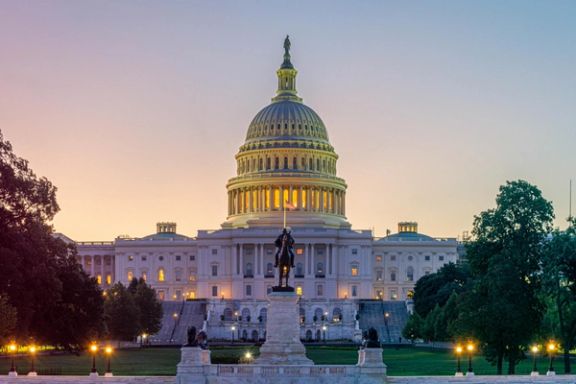
As US State Department once again denied any deals with Iran despite reports of many contacts, US lawmakers became vocal about any attempts to circumvent Congress.
The State Department spokesperson Matthew Miller in his press briefing on Thursday responded to questions by reporters about a possible deal in the making, saying, “with respect to Iran’s nuclear program, there is no deal.“
But the fact remains that the Biden administration has had even direct talks with Iranian diplomats for the past 7-8 months according to multiple reports, in addition to talks mediated by Oman and others.
Also, Washington agreed to the release of $2.7 billion of Iran’s money frozen in Iraq for “humanitarian” purposes. Some argue that no matter what the formal label of the arrangement may be any funds Iran can use for imports alleviates financial pressure from the cash-strapped regime.
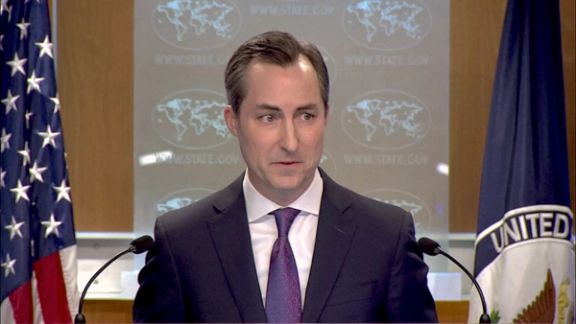
Given these concerns both Republicans and Democrats in Congress have begun stirring to make sure that the administration does not circumvent the lawmakers and according to law informs them of any deals with Iran.
"I'm extremely disappointed. To think this will end their uranium enrichment is childish. They'll continue to act in bad ways. When Iran is selling oil that it shouldn't, it gets those dollars and pumps it right back to extremist organizations," Sen. Joni Ernst told Iran International's Arash Aalaei.
The House Foreign Affairs Committee Chairman Rep. Michael McCaul sent a letter to President Joe Biden on Thursday saying, “I am disturbed by recent revelations that the Administration has re-engaged in “proximity talks” with the Iranian regime, and that the results of these discussions have included the apparent greenlighting of sizable payments to Iran.“
McCaul urged Biden to respect the Iran Nuclear Agreement Review Act of 2015 (INARA), which was enacted during the finalization of the Joint Comprehensive Plan of Action (JCPOA) in 2015 to allow Congress to oversee dealings with Tehran. The Obama administration decided not to make the JCPOA nuclear deal a treaty, given opposition in Congress at the time and agreed to INARA to neutralize opposition among lawmakers.
“I urge the Administration to remember that U.S. law requires that any agreement, arrangement, or understanding with Iran needs to be submitted to Congress pursuant to INARA. Any continued obstruction will rob the American people, and in particular the Gold Star families whose loved ones were killed by Iran-backed terrorism, of answers about why the United States is facilitating the lining of Iran’s coffers,” McCaul said.
The Jewish insider reported Thursday that Senator Lindsay Graham (R-SC), joined by Bob Menendez (D-NJ) and Sen. Richard Blumenthal (D-CT), also introduced legislation on Wednesday that would require the director of National Intelligence to notify Congress within 48 hours if Iran produces or possesses uranium of greater than 60 percent purity.
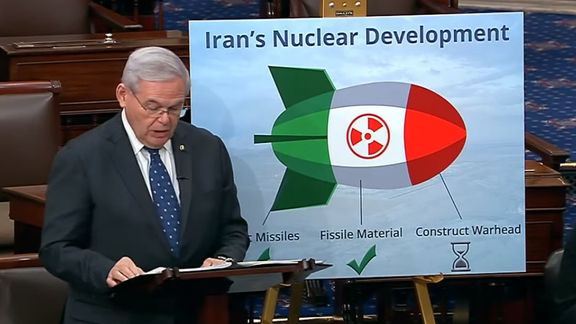
The Iranian Enrichment Monitoring Act is a new attempt led by Graham, Menedez and other lawmakers to ensure congressional oversight of how the executive branch deals with Iran’s nuclear program.
The website also quoted several senators, some supporters of the JCPOA voicing concern about secret dealings with Iran and releasing funds to the Iranian régime that continues its „malign activities“ in the region and sending arms to Russia.
State Department’s spokesperson Thursday more clearly listed what the administration seeks in its dealings with Iran.
"Number one, we want Iran to take steps to de-escalate tensions, which of course includes steps to curb its nuclear program," Miller said, and added that Iran should cease its actions that destabilize the Middle East.
"Number three, we want Iran to stop its support for Russia’s war on Ukraine,“ he said, referring to a new complication with Iran that emerged in mid-2022. He also demanded the release of US citizens Tehran has imprisoned „for political leverage."
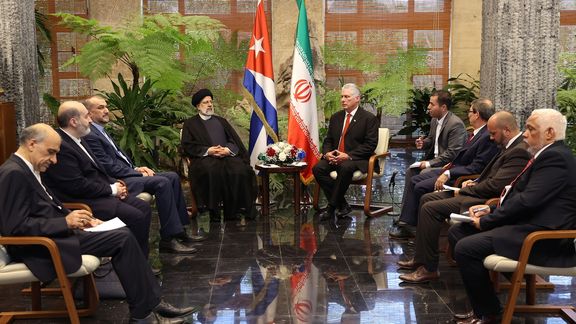
Iranian President Ebrahim Raisi says the goal of his three-nation tour of Latin America this week was forming an alliance to circumvent US sanctions.
Raisi, who arrived in Cuba for the last leg of his tour early Thursday, was received by Cuban Foreign Affairs Minister Bruno Rodriguez upon arrival at the airport and met with Cuban President Miguel Diaz-Canel at the Palace of the Revolution in Havana.
"Venezuela, Nicaragua, Cuba and Iran are among the countries that have had to heroically confront sanctions (...) threats, blockades and interference by Yankee imperialism and its allies with a tenacious resistance," Diaz-Canel told his Iranian counterpart, adding "This visit reinforced our conviction that we have in Iran a friendly nation in the Middle East, with which to confide ... and talk about the most complex global issues."
Raisi, in his turn, said, "The conditions and circumstances in which Cuba and Iran find themselves today have many things in common. Every day our relations grow stronger."
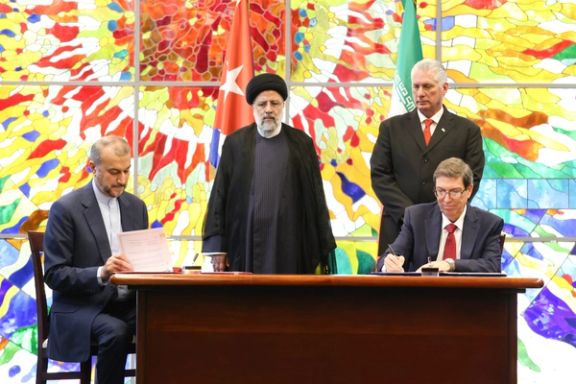
Raisi had earlier visited Venezuela, where he and President Nicolas Maduro pledged to boost bilateral trade from $3 billion to $20 billion within an unspecified time frame. Except Iran shipping oil and fuel to Venezuela and reportedly receiving gold, there is not much else the two sanctioned countries can trade.
He later visited Nicaragua, where he had a welcome ceremony at the Non-Aligned Square in the capital Managua led by President Daniel Ortega.
During all the stops, Raisi and the head of state of the host country oversaw ceremonies to signa raft of so-called economic agreements in a show of unity against the United States.
Common themes in Raisi’s speeches throughout the entire tour were creating a “new world order” that would overturn the US "domination" and cooperation among independent -- read sanctioned -- countries in the face of “the imperialist regime,” to become more resilient against US demands and its sanctions.
The three countries chosen as Raisi’s destination South are under scores of embargos over their shady economic dealings with blacklisted outfits such as Iran’s Revolutionary Guards and their track record of crackdown on dissent.
The Islamic Republic is relishing a sense of undermining its archrival, the US, as Raisi toured fellow sanctioned nations, celebrating it as a diplomatic coup de force at ‘America's backyard’.
During a joint press conference with his Nicaraguan counterpart on Wednesday, Raisi stressed the need for cooperation among “independent countries” towards neutralizing the predicaments that they commonly face, particularly Western sanctions.
"Cooperation between Latin American countries and other independent countries across various regions can forge a unity that can both neutralize sanctions and increase the capacities of the countries in question," he said, claiming that Iran “turned threats and sanctions into opportunities, and through these opportunities made great progress in different areas."

Riais's claim of successes contradict Iran's dire economic crisis and the daily criticism in Iran even by some of his allies.
Echoing similar anti-US sentiments, Ortega said: "We pay homage along with our heroes and martyrs, to all the heroes and martyrs of Iran and in particular to General Qassem Soleimani, who was assassinated by Yankee imperialism when he was fighting against terrorism."
The Iranian president was accompanied with a large delegation made up of ministers and officials as well as his wife, who also made headlines for her controversial remarks during an interview with a Venezuelan TV channel.
Claiming that governments abuse at the workplace in the name of freedom, Jamileh Alamolhoda – daughter of firebrand cleric Ahmad Alamolhoda – called it an example of violence when women study and work like men.
"We want women to remain women. Why should we be like men? Why should we study, work or live like men? This is a form of violence," she said.
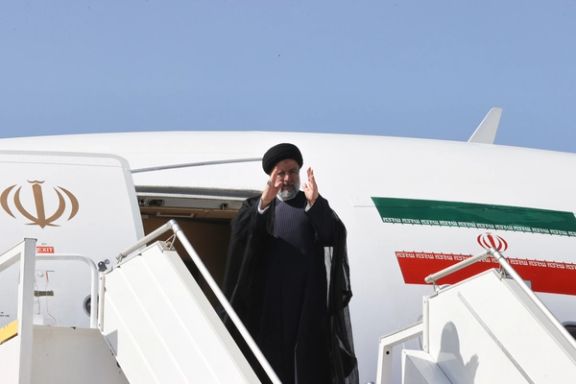
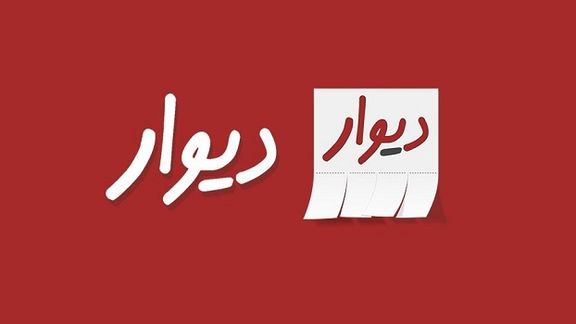
The Iran-based marketplace app, Divar, has been removed from Google Play as sanctions hit e-commerce.
According to an email published by Divar, Google said the app has been removed to comply with the sanctions regime of the United States against Iran.
“Products on Google Play may be subject to United States’ and other jurisdictions’ export control and sanctions laws and regulations,” read Google’s email.
Divar had more than 10 million active users before being removed from Google Play.
The company's public relations published a statement on its website Thursday warning that the removal of its application will cause the spread of malware of the same name and will violate the rights of users.
Meanwhile, according to research, Cafe Bazaar, as one of the subsidiary companies of Hezardastan Holding that owns Divar, is one of the reasons for spreading Android malware in Iran.
Google had previously removed some other applications developed in Iran from its store. In November last year, 10 Iranian apps were removed from the Google Play store, including Divar’s business competitor “Sheipour”.

Iran tested a suicide drone against a practice vessel in the Persian Gulf region and fired one other missile or drone without warning ships in the area, a US official said.
The one-way drone was launched on Wednesday from the Jask area of Iran 8-9 miles out to sea - within Iran's territorial waters - against a practice barge, the official said, citing US intelligence data.
"Essentially practicing hitting merchant vessels. That's the only reason why you would do that in the Gulf of Oman," the official said.
The United States has accused Iran of being behind several attacks since 2019 against merchant vessels in strategic Persian Gulf waters, which contain some of the world's most important oil and shipping routes.
Iranian media have so far not reported, and officials have not commented on the development.
Iran periodically tests explosive or suicide drones and broadcasts footage of them being tested.
"The closest merchant vessel was about 30 miles out away from the barge, but it was still dangerous," the official said.
Iran has supplied hundreds of its Shahed 131 and 136 suicide drones to Russia that have been extensively used against Ukrainian military and civilian targets.
Early on Thursday Russia launched 20 of these drones against Ukraine but all were shot down before reaching their targets. One purpose of the Iranian drones that are much cheaper than long-range missiles, is to swarm Ukraine’s air defenses during missile attacks.
Reporting by Reuters